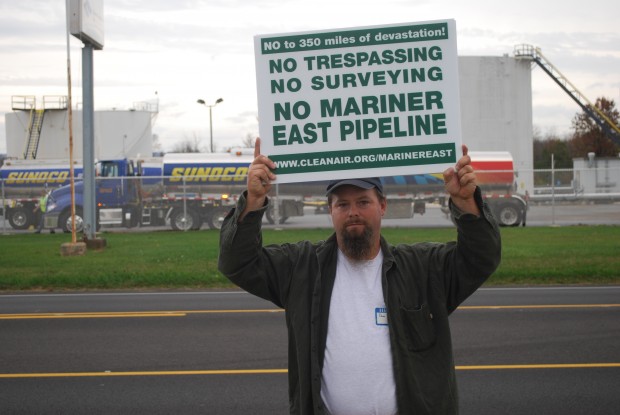Commonwealth court upholds eminent domain in Sunoco pipeline case
-
Susan Phillips

Dozens of eminent domain cases across the state have held up construction of the Mariner East 2 pipeline. Commonwealth Court ruled Thursday that Sunoco was a public utility, granted eminent domain authority by the PUC.” credit=”
A state appeals court dealt a blow to property owners fighting eminent domain takings by Sunoco Logistics on Thursday. Commonwealth Court ruled that in the case of the Mariner East 2 pipeline, Sunoco is a public utility subject to regulation by the Pennsylvania Public Utility Commission, which it says granted the company a certificate of public convenience that extends to all 17 counties along the hotly contested pipeline’s path. The majority 5-2 opinion cited the PUC’s decision:
[T]his authority [under existing CPCs] is not limited to a specific pipe or set of pipes, but rather, includes both the upgrading of current facilities and the expansion of existing capacity as needed for the provision of the authorized service within a certificated territory.
The Commonwealth Court decision, written by Judge Renee Cohn Jubelirer, determined that the Mariner East 2 pipeline is both interstate and intrastate, and therefore subject to jurisdiction by both the Federal Energy Regulatory Commission and the PUC.
Sunoco Logistics released a statement praising the decision.
“Although this case confirmed Sunoco Pipeline’s public utility status, we have always worked with landowners to reach mutually acceptable agreements, and pursued legal proceedings only in those instances where an agreement could not be reached. We believe negotiation is better than litigation, and that landowners receive more favorable terms and compensation as a result of easements that are negotiated rather than litigated.”
Judge Jubelire also wrote the court did not have any basis to review the PUC’s decision regarding whether or not the pipeline served a public need.
Public good has been a sticking point for landowners along the 350-mile Mariner East 2 pipeline route. Sunoco’s plan is to transport natural gas liquids from eastern Ohio and western Pennsylvania’s Marcellus and Utica Shales across Pennsylvania to the company’s terminal near Philadelphia, where it will ship to a facility in Scotland that manufactures plastics. The new pipeline mostly parallels the Mariner East 1 pipeline, which had once served to ship gasoline westward from Philadelphia refineries. Sunoco reversed the flow on that line and has been shipping gas east for export from the Port of Philadelphia.
When the company began approaching landowners for easements, it faced some stiff opposition, and ended up taking some to court over eminent domain. A 2014 ruling in York County Court of Common Pleas questioned the public good of the line. Subsequently, Sunoco added two off-loading terminals to the planned pipeline, one each in Berks and Lebanon counties. The company says the added terminals were in response to the polar vortex of 2014, when cold weather led to a lack of affordable heating fuels in the Northeast. But landowners say it’s a ruse to argue those two terminals serve a public need.
A spokesman for Sunoco, Jeff Shields, says the amount of propane gas required by customers in Berks and Lebanon counties has not yet been finalized.
Commonwealth Court Judge Patricia McCullough dissented to the majority opinion, questioning the motives of the company with regard to supplying propane to residents of Berks and Lebanon counties.
“The assertion that ME2 will have several new “on and off” ramp locations so as to ostensibly provide intrastate service, is, at the preliminary hearing stage, insufficient to counter the recent representation Sunoco made to the Court of Common Pleas of York County that ME2 was exclusively interstate. In order to uphold the invocation of the power of eminent domain, the justification must be genuine and real, not hypothesized, or invented post hoc in response to litigation.”
Rich Raiders, an eminent domain attorney representing dozens of residents in similar cases against Sunoco’s Mariner East 2 project read the Commonwealth’s decision with a ray of hope.
“I’m hopeful that they will accept my request to have oral argument on this question [of public good],” he said. “I can guarantee you that one or more of these cases will be going to go up to the supreme court.”
















